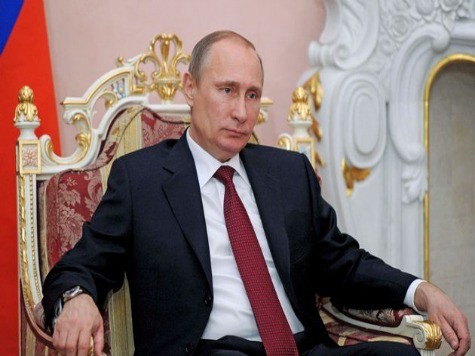The Fédération Internationale de Football Association (FIFA) is refusing to back down on its decision to award the 2018 World Cup to Russia despite Russia’s untoward lobbying effort and its illicit invasion of Ukraine.
With the decision by the soccer commission to award the 2018 World Cup to Russia, many are starting to see the way the strings were pulled by Russian strongman Vladimir Putin to make sure the games went his way.
Just last year eyebrows were raised when news broke that Russia’s state controlled energy company Gazprom became FIFA’s biggest sponsor. Photos were revealed in 2013 showing Russian bossman Putin, Gazprom chief executive Alexei Miller, and Russian sports minister Vitaly Mutko in a meeting with FIFA’s president.
After the organization awarded Russia the 2018 World Cup, Brighton University School of Sport & Service Management professor Alan Tomlinson said, “The Russian story is one of a planned, sustained, and resourced campaign to gain influence and affect people over a period.”
As Bloomberg recently reported,
It is unprecedented, Tomlinson says, for a government minister such as Mutko also to sit on FIFA’s executive board. It is also, in theory, a violation FIFA’s own rules. Mutko ran Russia’s bid for the 2018 World Cup–and he also had a vote in the body that decided it.
And this all-too-cozy relationship between Russia and the FIFA board is exacerbated by Russia’s nakedly expansionist, aggressive attacks on Ukraine. Not to mention the downing of the Malaysian jet liner that appears attributable to Russian rockets in the hands of Russian-backed Ukrainian separatists.
Despite the unseemly nature of the FIFA award of the 2018 World Cup to Russia, the soccer commission is not backing down. On Friday, FIFA released a statement quixotically insisting that having the games in Russia will highlight Russia’s aggressive actions and help alleviate them.
As a world governing body of football FIFA takes its responsibility in governing football seriously and we support any peaceful and democratic debate. FIFA deplores any form of violence and will continue to use its tournaments to promote dialogue, understanding and peace among peoples.
History has shown so far that boycotting sport events or a policy of isolation or confrontation are not the most effective ways to solve problems. The hosting of the FIFA World Cup with the global attention it attracts can be a powerful catalyst for constructive dialogue between people and governments, helping to bring positive social developments. The FIFA World Cup unites teams and nations from all over the world, from the qualifiers to the final competition in a spirit of fair play and respect.
FIFA is convinced that, through football, particularly the FIFA World Cup and its international spotlight, we can achieve positive change in the world, but football cannot be seen as a solution for all issues, particularly those related to world politics. We have seen that the FIFA World Cup can be a force for good and FIFA believes this will be the case for the 2018 FIFA World Cup in Russia.
The award to Russia isn’t the only eyebrow raising decision recently made by FIFA.
In 2010 the soccer agency awarded the 2022 games to Qatar despite the fact the oil-rich nation has no soccer team, no connection to international soccer, and a forbidding summer environment for players. As soon as the award was announced, FIFA was charged with accepting bribes of oil money offered by Qatari officials.
Like Russia’s unjustified invasion of Ukraine, Qatar has it’s own human rights issues. For years the tiny nation has been hit with charges of human rights abuses of its imported workforce.
According to Human Rights Watch (HRW), migrants and foreign workers in Qatar continue to “experience serious rights violations, including forced labor and arbitrary restrictions on the right to leave Qatar, which exposed them to exploitation and abuse by employers.”
In 2012, Human Rights Watch criticized the awarding of the World Cup to Qatar. HRW said that Qatar and FIFA need to make “public commitments to uphold international labor standards” and improve civil rights for non-citizens.
Follow Warner Todd Huston on Twitter @warnerthuston or email the author at igcolonel@hotmail.com

COMMENTS
Please let us know if you're having issues with commenting.